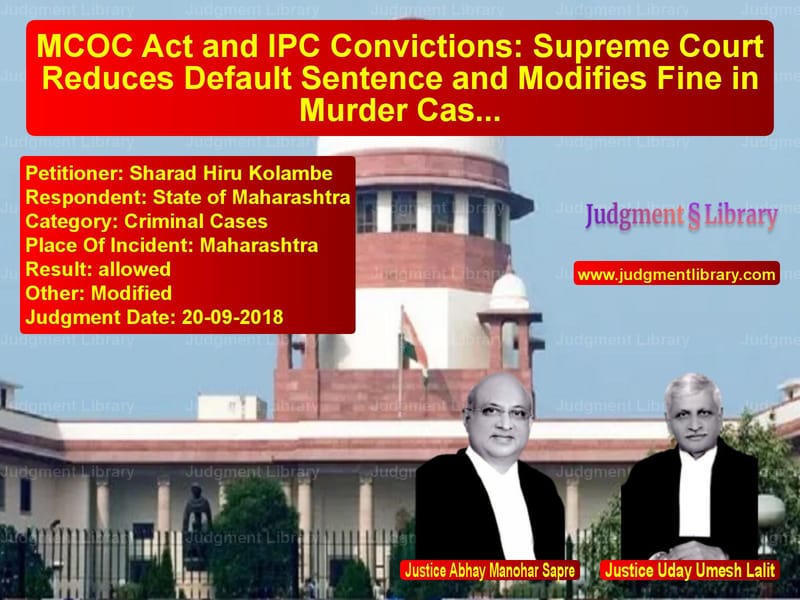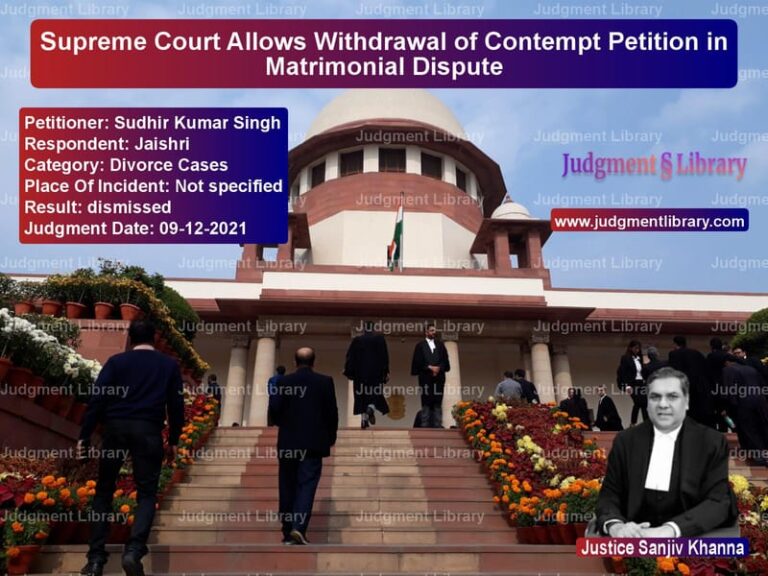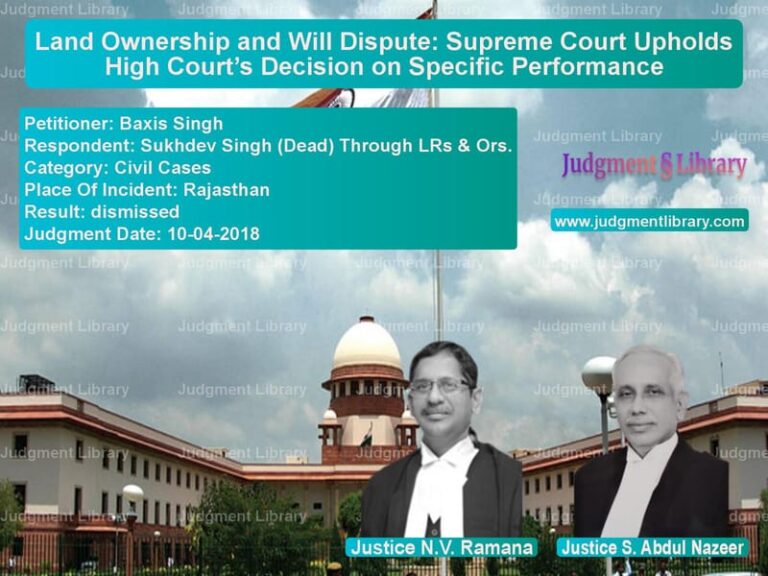MCOC Act and IPC Convictions: Supreme Court Reduces Default Sentence and Modifies Fine in Murder Case
The case of Sharad Hiru Kolambe vs. State of Maharashtra revolves around the application of sentences under the Maharashtra Control of Organised Crime Act (MCOC Act) and the Indian Penal Code (IPC) for serious criminal offenses, including kidnapping and extortion. The Supreme Court was tasked with determining whether the default sentences for non-payment of fines were excessive and whether the quantum of fines imposed could be reconsidered given the financial hardship of the accused.
Background of the Case
The appellant, Sharad Hiru Kolambe, was involved in a serious criminal case under the MCOC Act, which deals with organized crime syndicates. He was convicted for various offenses under the IPC and the MCOC Act, including kidnapping for ransom, extortion, and threats to cause harm, resulting in life imprisonment and substantial fines. These offenses included Sections 364A, 395, 397, and 387 of the IPC, as well as Sections 3(1)(ii), 3(2), and 3(4) of the MCOC Act.
The appellant had been arrested on August 26, 2001, and was sentenced by the Special Judge under the MCOC Act on October 20, 2005, to serve multiple concurrent sentences for the offenses committed. The total sentence was comprehensive, involving a life sentence and fines amounting to Rs. 15,04,000, with default sentences for non-payment of fines extending up to 10 years.
After serving time, the appellant approached the Supreme Court, arguing that the default sentences were disproportionate, especially given his family’s severe financial distress. The appellant’s counsel requested that the default sentences be reduced and that the fines be reconsidered.
Petitioner’s Arguments
- The appellant’s counsel, Mr. Colin Gonsalves, argued that the cumulative fine of Rs. 15,04,000, coupled with the default sentence of 10 years, was exorbitant and unjustifiable.
- The appellant’s family was in financial ruin, with reports indicating that they were living in conditions of starvation. It was thus impossible for the appellant to pay the fine.
- The appellant contended that, while the substantive sentences for the various charges were appropriate, the default sentences for non-payment of fines should be made to run concurrently, not consecutively.
- Drawing on previous judgments, including the cases of Palaniappa Gounder, Shantilal, and Shahejadkhan Mahebubkhan Pathan, Mr. Gonsalves emphasized that the courts had reduced default sentences in cases where the convicted person’s financial situation was dire.
Respondent’s Arguments
- The State of Maharashtra, represented by Mr. Nishant R. Katneshwarkar, countered that the default sentences for non-payment of fine were in line with legal norms.
- The State referred to the decisions of the Supreme Court in V.K. Bansal and the Madras High Court’s decision in Donatus Tony Ikwanusi, which upheld the principle that default sentences could not be ordered to run concurrently.
- The State argued that the appellant’s financial condition could be taken into account to reduce the default sentences, but not to the extent of reducing them entirely or ordering them to run concurrently.
Supreme Court’s Observations
The Supreme Court reviewed the case and made several critical observations:
- Consecutive Default Sentences: The Court noted that while Sections 31 and 427 of the CrPC allowed for concurrent sentences in the case of multiple substantive sentences, no such provision existed for default sentences. The Court emphasized that default sentences are considered separate penalties and are in addition to the substantive sentences imposed for the crimes committed.
- Default Sentences Cannot Run Concurrently: The Court relied on its previous rulings and the statutory provisions under Section 64 of the IPC and Section 30 of the CrPC, which explicitly prohibit default sentences from running concurrently with substantive sentences. Default sentences are imposed as penalties for the non-payment of fines and must be served in addition to other sentences.
- Sympathetic Consideration for Financial Hardship: While the Court rejected the plea for concurrent running of default sentences, it acknowledged the appellant’s financial hardship. The Court reduced the default sentence for each of the three counts under the MCOC Act from three years to one year, considering the appellant’s family situation.
- Proportionality of Default Sentences: The Court agreed with the appellant’s contention that the default sentences for non-payment of fines, especially in cases involving high fines, should not be disproportionate to the offender’s ability to pay. The Court modified the default sentence in this case to make it more reasonable.
Key Judgment Excerpts
The Court held:
“The term of imprisonment in default of payment of fine is not a sentence but a penalty that the person incurs on account of non-payment of fine. The default sentence must be treated separately and cannot run concurrently with substantive sentences, as specified in the law.”
Regarding the reduction of default sentences, the Court observed:
“Considering the financial condition of the appellant and his family, we find that the default sentences imposed under the provisions of the MCOC Act are slightly excessive. We reduce the default sentence for each count to one year, as opposed to the originally imposed three years.”
Final Judgment
- The Supreme Court reduced the default sentences from 10 years to three years and four months for the appellant.
- The Court also reduced the default sentences for offenses under the MCOC Act from three years to one year for each of the three counts.
- The appellant was ordered to pay fines of Rs. 5 lakhs for each of the three MCOC counts and the total fine was maintained at Rs. 15 lakhs.
- Despite the reduction in the default sentence, the appellant was directed to complete the remainder of his sentence, which amounted to three years and four months, the default sentence having already been partially served.
Conclusion
This judgment reflects the Court’s approach towards balancing the severity of penalties with the realities of an offender’s financial capability. The Supreme Court’s decision to reduce the default sentence underscores the need for proportionality in imposing financial penalties. The ruling clarifies the legal framework regarding default sentences and reaffirms that they are not meant to run concurrently with substantive sentences. This case serves as an important reference for future cases involving default sentences under the IPC and MCOC Act.
Petitioner Name: Sharad Hiru Kolambe.Respondent Name: State of Maharashtra.Judgment By: Justice Abhay Manohar Sapre, Justice Uday Umesh Lalit.Place Of Incident: Maharashtra.Judgment Date: 20-09-2018.
Don’t miss out on the full details! Download the complete judgment in PDF format below and gain valuable insights instantly!
Download Judgment: Sharad Hiru Kolambe vs State of Maharashtra Supreme Court of India Judgment Dated 20-09-2018.pdf
Direct Downlaod Judgment: Direct downlaod this Judgment
See all petitions in Murder Cases
See all petitions in Fraud and Forgery
See all petitions in Custodial Deaths and Police Misconduct
See all petitions in Judgment by Abhay Manohar Sapre
See all petitions in Judgment by Uday Umesh Lalit
See all petitions in allowed
See all petitions in Modified
See all petitions in supreme court of India judgments September 2018
See all petitions in 2018 judgments
See all posts in Criminal Cases Category
See all allowed petitions in Criminal Cases Category
See all Dismissed petitions in Criminal Cases Category
See all partially allowed petitions in Criminal Cases Category







